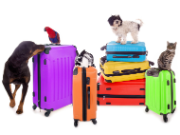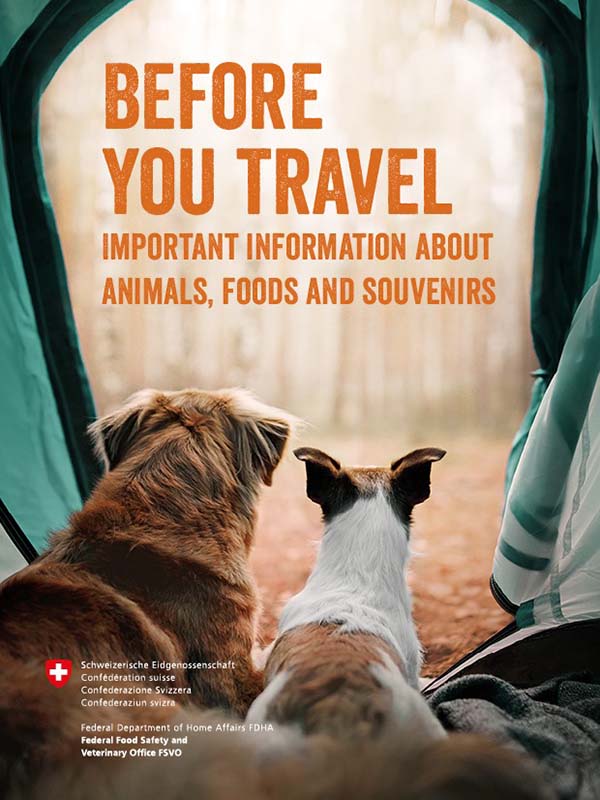Travelling with pets requires a great deal of preparation. Vaccinations, licences or other documents may be needed. And the animal's welfare needs to be ensured during the jourey too.

Animal owners need to familiarise themselves with the travel regulations before they travel with pets. They also need to ensure that the animal's needs can be met during the journey and at the holiday destination.
Preparing for travel
Veterinary and species conservation regulations
Since dogs, cats, ferrets and birds can introduce diseases from other countries, travel with these animals is subject to strict veterinary regulations. Other animals that are members of protected species, such as parrots, also need (additional) special documents to ensure that they can leave and enter the country without difficulty. People travelling with this kind of animal must ensure that these conditions are met before they travel. The specific regulations and the related documents can be found on the following pages:
- Travelling with dogs, cats and ferrets
- Travelling with birds
- Travelling with animals of a protected species
Preventing diseases
In addition to rabies, animals can bring home a large number of other diseases from a holiday, particularly parasitic diseases such as piroplasmosis (also known as babesiosis) or leishmaniasis (transmitted by ticks or mosquitoes). Your vet can tell you whether your pet requires vaccines and, if so, which ones.
After the holiday it is a good idea to worm the animal. Particularly if you have travelled to a distant destination, you should pay attention to any change in the animal's behaviour (abnormal tiredness, loss of appetite, fever or digestive problems, discoloured urine). If in doubt, it is a good idea to have the animal examined by your vet.
Look into the situation at your holiday destination
You should look into the following questions before you travel:
- Are pets allowed at your holiday destination?
- Is your holiday suitable for the animal (active vs. passive holidays)?
- Are pets allowed in your holiday accommodation/on the beach?
- Are dogs required to wear a lead and/or muzzle?
- Does the destination or one of the countries you will be passing through ban the entry of dangerous dogs?
Animal welfare while travelling
If you really want to take your pet on holiday with you, you must remember that animals react very differently to a change of environment. The journey, an unfamiliar place and many other factors always stress an animal to a certain extent. You need to take precautions and clarify various points to ensure your animal's wellbeing during the journey.
Travelling with pets in a car
- The animal must be placed in the car in such a way that it cannot endanger the driver. This may be behind a grille or in a carrier with which it is familiar. The carrier must be big enough for it to stand upright and lie down comfortably.
- The climate in the car – especially in the area where the carrier is placed – must be suitable for the animal.
- The animal must be able to drink water regularly during long car trips.
- Animals (and dogs in particular) need regular stops and short walks so that they can relieve themselves.
- The animal's usual food will not be available everywhere. In case of doubt, travellers should take an adequate supply with them.
Travelling with pets in an aeroplane
The International Air Transport Association (IATA) explains how animals can travel in an aircraft. You must notify the airline in advance that you will be travelling with an animal. Your vet will be able to tell you whether your pet needs medication and food for the journey.
Accompanied entry: Any pet that does not enter Switzerland in the passenger cabin with its owners accompanying it, but in the hold of the aircraft must be checked in as "AVI in hold" or "excess baggage".
This makes it clear to all concerned (airline, border veterinary officers, customs) that the animal is accompanied. If the animal travels with a separate airway bill (AWB), it will be treated as a freight shipment on arrival at the airport and taken to the animal facility. This will mean additional costs and time for the accompanying person. The airline bears organisational responsibility for this procedure. You as the owner should make sure that the animal is booked in correctly at check-in. Neither the border veterinary service nor the FSVO accept responsibility for correct booking, nor will they undertake any coordination.
Unaccompanied entry: If a pet cannot enter the country accompanied by its keeper, it may travel as air freight. In this case different formalities apply. Unaccompanied pets can only enter the country via Zurich and Geneva airports.
An unaccompanied pet may enter the country within 5 days before or after its keeper's arrival. If this timeframe cannot be complied with, it must be ascertained whether the animal was already in the care of its keeper in the country of origin. The relevant information and documents are to be sent to the FSVO for assessment.
Should pets be sedated?
It is generally not necessary to sedate pets. Sedatives may have side effects such as loss of muscle strength and suppression of thirst. Calming pheromones are an option for very nervous animals. However, animals can also suffer from motion sickness. In this case they need to be habituated to longer trips before the holiday and can also be given medication to counter motion sickness. In such situations it is vital to obtain advice and a prescription from a vet.
More information
Last modification 12.12.2023





